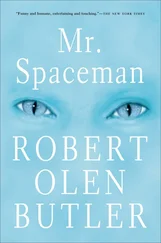“What the hell are you doing?” his father says.
Jimmy finds that the prospect of even speaking the words to this man makes his mouth clench. That he and his father have not spoken of Vietnam since Labor Day — have hardly spoken at all — makes him confident this is true: “You know what I’m doing.”
That William Quinlan is making no reply confirms it.
The silence ticks on, filled with long-distance static and now a distant car horn and now Linda’s hand falling upon Jimmy’s shoulder, squeezing gently there, and remaining, remaining as he waits for a last few words that surely will come.
And then they do, though more simply than Jimmy expected, and therefore more final.
His father says, “Good-bye then.”
And through the thousand miles of telephone wires comes the click that was the last sound from his father through the forty-six years since.
Jimmy sees the pines, as if he has just opened his eyes from sleep.
He looks at Linda.
She is staring into her cup of tea.
Jimmy looks at his own cup.
So.
He picks up the cup. Sips.
Puts the cup down. The faint tap and scrape of china upon china.
“I wish I could help you,” Linda says.
He looks at her.
Her eyes hold on him now.
“Why do you think you need to help me?” he says.
Something seems to release in her. A tension he did not notice. She nods.
“Why do you think you can’t?” he says.
She sniffs. Looks at her teacup. Drinks from it.
“You and your father,” she says without looking at him. She says no more. That is answer enough for both questions.
He studies the tree line.
He senses how comfortable he and Linda are together. At last. For how many years of their marriage would this event have prompted a spirited conversation, a recitation of shared beliefs, a problem-solving debate about families and politics and ethics. A loving, respectful debate, but a debate.
Now they are quiet.
From that sense of comfort he feels he needs to reassure her. “I’m fine,” he says.
“Truly?”
“Truly.”
“Of course,” she says, as if reassuring herself this could be true. “After all this time.”
“Yes,” he says.
“Good,” she says.
And they are quiet for a few moments more.
Then Linda says, “Then can I ask a favor?”
They are looking at each other again.
“Of course,” Jimmy says.
“Don’t let your father’s situation get you started,” she says.
One debate topic has not dissipated with their long-accumulated closeness, one that began only a couple of years ago. He has already ceased to speak of the subject. He’s told her he has. She doesn’t need to lean on it at this moment.
Thinking these things, he remains silent for a few beats.
She clarifies, unnecessarily. “Your recent interest in a supposed afterlife.”
Jimmy thinks: Ah, my darling, you are still young, as you have once again begun to seem. You still have faith in nothingness. And he hears himself beginning to debate her in his mind, where he concedes: I envy you your faith. It is worse to wonder.
Linda says, “I’m sorry. That sounded harsh. Particularly under the circumstances.”
“No,” he says. “It’s all right.”
She nods. And she seems to be waiting. For what? He’s absolved her for harshness. He has already pledged to keep his thoughts on this subject to himself. He says no more.
She says no more.
They drink their tea and then, side by side, carry their cups and saucers to the sink.
Darla parks in front of the nineteenth-century brick opera house just off Monticello’s traffic circle. In the center sits the Jefferson County Courthouse, in the Classic Revival style of the town’s namesake. She crosses the street and turns to her left to circle the building, her eyes on the monument for the Confederate dead at the north side. From this approach, only its eight-foot base is visible beyond the waxy, evergreen crown of a century-old magnolia.
She has come here to fight against her mind. The semiotician part — studying signs, the signifiers and the signified — is prone to jargon-driven incomprehensibility; the art scholar part — studying created objects — can easily be stricken aesthetically blind. Both parts constantly threaten to cut her off from fundamental human life as it is lived, first and foremost: in the moment, through the senses. Not that she doesn’t love her mind. It is always quick, for instance, to see a good irony, such as this very distrust of her mind having itself begun as an idea. And it was her analytical self that challenged her to look more deeply at these monuments, issuing the challenge in this very town after she and Robert came here with friends for roadhouse food and antiques and found this relic of Old South, lost-cause passion and laughed at its excesses and, yes, at its unintended semiotics.
To give voice to this monument’s signified meaning, both in its own era — the last years of the nineteenth century — and in this era, she needs time to stand and meditate on the thing. She is convinced that at the deepest level its meaning is essentially a meaning of the body. Of the bodies of this monument’s creators. The bodies of the women of the Ladies’ Memorial Association of Jefferson County, Florida, and of the United Daughters of the Confederacy.
As Darla approaches she is surprised to find her own body trilling a little at the longings signified in the part of the sculpture hidden behind the crown of the magnolia. But even with her empathy already engaged, in the next few moments, as the centerpiece of the memorial becomes visible, it is difficult for her to see the thing in terms other than those that make for easy, companionable, derisive twenty-first-century laughter: a monumental shaft rises long and straight there, condomed in a Confederate battle flag, showing itself to her suddenly from behind the tree like a Johnny Reb dropping his pants, his man-part ready for action, its condition even captioned in marble at the base: ERECTED 1899. Erected still, a hundred and fifteen years later, in perpetual frustration.
She draws near the monument.
She grows still inside.
This is not just about facile Freudianism.
The frustration commemorated here is real and deep and human. It is not simply the outcome of a failed political cause but of failed human connection. These were women trapped in a male-driven time and culture that both inflamed and suppressed their passions, intellectual and physical. Inflamed and suppressed and thus redirected and inflated them.
And these were women whose men were savaged and broken and traumatized and distorted and reinvented by war. It is not lost on Darla, as she stands before the western face of the monument, that she is herself part of just such a generation of women.
And without votes, without clear forms of influence, but in bodies and minds roiling with nascent independent identities and with passions that cried out for self-driven expression, these nineteenth-century Southern women created clubs. Became clubwomen. To think and feel and organize together. History clubs and travel clubs and library clubs. Improvement clubs and betterment clubs and advancement clubs. A Ladies’ Memorial Association. The Daughters of the Confederacy. And in this town, as in almost every other town, a literary club. Darla could see the women of the Jefferson Country Literary Club convening in the parlor of one of their Carpenter Classic homes on a weekday afternoon, just the women, in shirtwaists and Newport knots, sitting together, dreaming together, creating words together, writing them down, these purplish, engorged, sublimating words before which she now stood.
Let this testimonial of woman’s deathless fidelity to man’s imperishable valor speak to the sons and daughters of this Southland for all time to come.
Читать дальше












